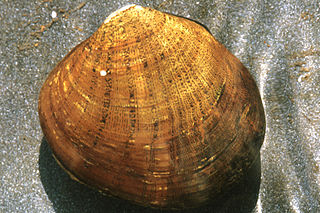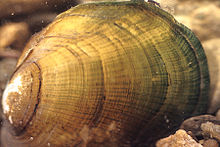
The northern riffleshell, is a subspecies of freshwater mussel, an aquatic bivalve mollusk in the family Unionidae, the river mussels.

The fanshell is a species of aquatic bivalve mollusk in the family Unionidae. This clam is native to the United States, where breeding populations remain in only three rivers. It is a federally listed endangered species of the United States.

Dromus dromas, the dromedary pearlymussel or dromedary naiad, is a rare species of freshwater mussel in the family Unionidae. This aquatic bivalve mollusk is native to the Cumberland and Tennessee River systems in the United States, where it has experienced a large population decline. It is a federally listed endangered species of the United States.

Epioblasma is a genus of freshwater mussels, aquatic bivalve mollusks in the family Unionidae, the river mussels. Most of the species in this genus have been lost in modern times, and the entire genus is threatened with the possibility of extinction.

Epioblasma biemarginata, the angled riffleshell, was a species of freshwater mussel, an aquatic bivalve mollusk in the family Unionidae, the river mussels. It is now extinct.

The Cumberlandian Combshell is a species of freshwater mussel, an aquatic bivalve mollusk in the family Unionidae. This species is endemic to the United States, found mainly in the states of Tennessee and Virginia. This mussel resides in medium-sized streams to large rivers. The combshell is an endangered species and protected under the Endangered Species Act of 1973. The combshell is threatened by habitat modifications and pollution.

The oyster mussel is a rare species of freshwater mussel in the family Unionidae. This aquatic bivalve mollusk is native to the Cumberland and Tennessee River systems of Kentucky, Tennessee, Alabama, and Virginia in the United States. It has been extirpated from the states of Georgia and North Carolina. It is a federally listed endangered species of the United States.

Epioblasma flexuosa, the arcuate pearly mussel or leafshell, was a species of freshwater mussel, an aquatic bivalve mollusk in the family Unionidae, the river mussels. This species was endemic to the United States, where it was found in the major drainages of the Ohio River, including the Cumberland, Tennessee, and Wabash Rivers. Its natural habitat was flowing water.
The upland combshell was a species of freshwater mussel in the family Unionidae. It was endemic to the upper Mobile River Basin in the southeastern United States.
Epioblasma othcaloogensis, the southern acornshell or southern acorn riffle shell, was a species of freshwater mussel in the family Unionidae. It was only known from the Coosa and Cahaba Rivers of the southeastern United States.

Epioblasma propinqua, the Tennessee riffleshell or nearby pearly mussel, was a species of freshwater mussel in the family Unionidae. It was endemic to the United States, where it was found in the drainages of the Cumberland River, Ohio River, and Tennessee River.

Epioblasma sampsonii, the Wabash riffleshell or Sampson's naiad, was a species of freshwater mussel in the family Unionidae. It is now extinct.

Epioblasma turgidula, the turgid blossom pearly mussel, turgid riffle shell, turgid-blossom naiad or turgid blossom, was a species of freshwater mussel, a mollusk in the family Unionidae. It is now extinct.

Epioblasma triquetra, common name the snuffbox mussel, is a species of freshwater mussel, a mollusk in the family Unionidae. It is native to eastern North America, where it is a listed as an endangered species in both Canada and the United States.

Epioblasma torulosa, commonly called the tubercled blossom, is a species of freshwater mussel, a mollusk in the family Unionidae. It is native to eastern North America, where it is considered endangered in both Canada and the United States.

Epioblasma obliquata, commonly called the catspaw, is a species of freshwater mussel. It is native to eastern North America, where it is classified as endangered under the Endangered Species Act.

Epioblasma ahlstedti, commonly called the Duck River dartersnapper, is a species of freshwater mussel, an aquatic bivalve mollusk in the family Unionidae, the river mussels.
















